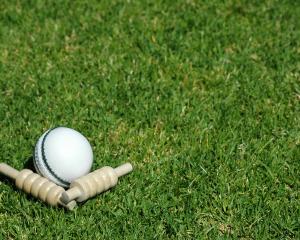Former New Zealand and Otago wicketkeeper Barry Milburn has returned home to Mosgiel after living in Australia for the past 18 years. Cricket writer Adrian Seconi caught up with the man many considered an artist in gloves.
Wrapped in a grey plastic bag and tucked away in a wooden box on a bookshelf is one of Barry Milburn's most treasured possessions - a simple Black Cap with a nice, crisp Silver Fern on it.
After quite of bit of cajoling, the modest 72-year-old is eventually convinced to take it out and pose for a picture with it.
His stubby, gnarled fingers fumble with the wrapping, which probably started out life as a humble supermarket bag before it ended up hitting the jackpot.
And that is how Milburn feels about his brief international career.
He played three tests for his country in 1969 - all against the mighty West Indies.
But if you ask him, he says "I was lucky to play for my country''.
His first scalp in international cricket was the great Garry Sobers.
He took the catch off the bowling of spinner Vic Pollard.
He grabbed six catches and effected two stumpings during the series, which was memorable from New Zealand's point of view because of the six-wicket win in Wellington.
It was the country's fifth test win.
But around these parts Milburn is better remembered for his emotional and unlikely century, his loyalty, his remarkable comeback and, of course, his dazzling work behind the stumps.
Milburn played for Otago at a time when swift work up at the wicket and a safe pair of hands was enough to keep your spot.
Any runs scored were considered a bonus.
But Milburn and his ilk were phased out by the rise of the wicketkeeper-batsman.
After 11 seasons behind the stumps, Milburn lost his place to Otago great Warren Lees.
Lees was a very accomplished wicketkeeper but it was what he could offer with the bat that made the difference.
Despite his way being blocked, Milburn remained loyal to the province and never considered playing anywhere else.
"Oh no. We had a business here and I'd played for 11 years, you know what I mean,'' he said.
"I still captained the Otago B team and played with a lot of young guys and I thoroughly enjoyed it.
"When Ray Hunt asked me if I'd play for Otago again, I went to Billy Ibadulla for coaching.
"I really enjoyed the two years I came back and played. I just wanted it more than anything else.''
Milburn, who was 37 when he made his comeback, was running between "four and five miles a day'' and put more work into his batting.
Six years after playing his last first-class game for the province, Milburn played an instrumental role in Otago's dramatic one-wicket win against Wellington at Molyneux Park.
With his side 74 for three, Milburn was promoted in the order and given the job of getting the team to stumps without further loss.
He struggled through to stumps and in the scorching heat the following day he poked, pushed and prodded his way towards his maiden and only first-class hundred.
In a 2011 article, former Otago Daily Times sports editor Brent Edwards described it as the "most tenacious century made by any Otago batsman'' he had seen.
Milburn was typically modest about his effort and tried to deflect the attention.
"I always remember it was very hot that day.
"Wellington had quite a good side. They had Peter Petherick and Evan Gray and quite a few good pace bowlers. It was just a matter of grinding it through, really.
"I used to make quite a few runs in club cricket for Taieri. I got out in the 90s a couple of times and bits and pieces but Billy was very good,'' he said in a nod to his coach.
"You always think you should be better and I should have been a better bat than I was.''
He certainly worked hard honing his silky keeping skills.
Regarded by some observers as the best New Zealand keeper of his era, he had a training regime not unlike that of the great Sir Donald Bradman.
"I used to practise with a golf ball against a brick wall from angles,'' he said.
"I did that at home and I practised a lot. I loved it. You just have to want every ball to come to you.
"If you can go through a session without dropping a ball, then you've done your share, believe me.
"When you get a chance, it is usually because one keeps a bit low or it jumps up or moves a wee bit further way, so [practising with] a new ball on a roughish pitch actually helped me a lot as well.''
Milburn toured England, Pakistan and India with the New Zealand side in 1969 but an injury and Ken Wadsworth's superior batting credentials saw his brief international career peter out.
On that tour, Milburn drew inspiration from England's Alan Knott and Bob Taylor.
"They were very good little keepers. I always thought the English were the best. They stood up to the medium pacers, whereas the Australians, with the extra bounce in the wickets, did not stand up to the medium pacers the same.''
Getting up to the stumps was something that Milburn looked to do at every opportunity.
There is nothing like breathing down the back of the neck of a batsman to mount pressure.
"If I saw them getting out of their crease, I'd move up and make sure they maintained their ground.
"I used to encourage the bowlers and I wouldn't say I was nasty at the stumps, but I always let them know I was there.
"That was part of it.''
Milburn stayed involved with cricket following his retirement. He had a five-year stint at the New Zealand Cricket Academy, where he coached the likes of Peter McGlashan, Gareth Hopkins, Martyn Croy, Robbie Hart and Chris Nevin.
He has spent the past 18 years living in Queensland and retired about four years ago.
He had been managing apartment blocks but made regular trips back to New Zealand to visit family.
He has two daughters in Dunedin and one in Christchurch and decided the time was right to move home permanently with his wife, Jen.












